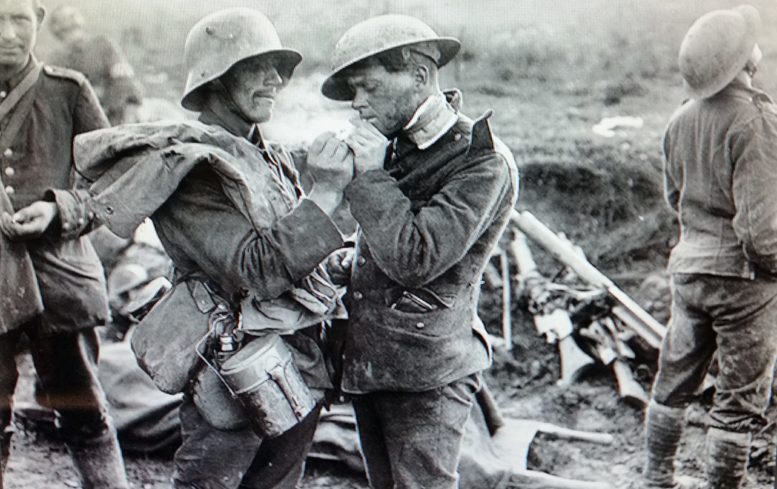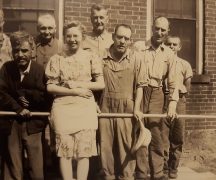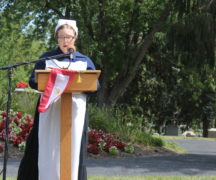By JAN LARSON McLAUGHLIN
BG Independent News
Wars have always churned out scores of stories, some true, some not.
One story that stuck from World War I is the Christmas truce of 1914 – when troops on both sides left their miserable trenches to spend one magical day celebrating the holiday with their enemies.
Though many of the details have grown foggy over the decades, there is much truth to the truce saga, according to Michael McMaster, educational program coordinator for the Wood County Historical Center. McMaster recently presented a program on the Christmas truce of 1914 during one of the historical center’s “teas” at the museum which has dedicated its entire site this year and next to WWI and its impact on Wood County.
“It’s not a question of if the Christmas truce occurred,” McMaster said. “It is a question of how the Christmas truce occurred.”
One of the reasons the details may be so thin, is that the truce was unsanctioned by leadership on either side of the war. In fact, the commanders disapproved of the truce, believing it could soften their troops.
But it occurred in spite of censure from the higher ranks. The men in the trenches took it upon themselves to cautiously reach out to their enemies for a one-day reprieve from fighting.
“It was a spontaneous and unofficial truce,” McMaster said.
In 2005, a Scottish soldier at age 109 recalled the truce that he witnessed as a soldier. “It was a short peace in a terrible war,” McMaster said the man remembered.
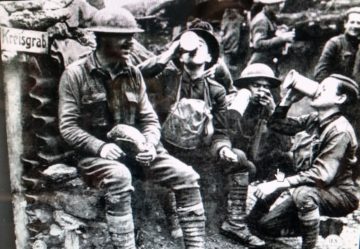
WWI had started in July of 1914, and fighting on the Western Front had been particularly brutal between August and December. This was the first time that trench warfare was used so extensively. In August alone, an estimated 75,000 French soldiers had been killed. The Germans were poised to take Paris, but the French dug in. Before long, the German fatalities numbered 40,000, McMaster said.
By December, there was a stalemate, with 12,000 miles of Allied trenches, and 13,000 miles of German trenches. “There was almost no movement of this line,” McMaster said.
Making matters worse, the troops not only fought in the trenches, but also lived in them.
“The weather was terrible. The mud was terrible. The living conditions were terrible,” McMaster said.
The idea of a Christmas truce was introduced by the newly named Pope Benedict XV. Officials from the U.S. – which was still neutral at this early point in the war – also called for a 20-day truce in December. But those suggestions were rejected.
“All sides continued to fight up until Christmas Day,” McMaster said.
The generals on both sides discouraged any truce – no matter how temporary. But they weren’t the ones living in the trenches.
“The reality was that the soldiers in the trenches were suffering greatly,” McMaster said. “The trenches were full of water up to their waists” in some areas.
According to the stories, the soldiers seemed to test the idea of a truce sometime on Christmas Eve as they started singing carols like “Silent Night.” Then in the morning, some of the troops cautiously emerged from their trenches and wished their enemies a Merry Christmas. They laid down their weapons, and gathered in the “no man’s land” between the trenches.
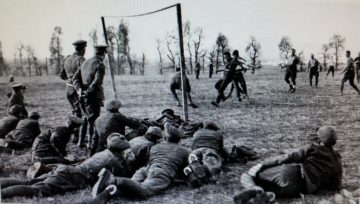
Tales of that day tell of German, British and French troops sharing food, whiskey, family photographs and tobacco. Letters sent home to families told of the enemies trying on each others’ helmets, and playing football, (known as soccer in the U.S.) One British soldier wrote to his mother to say he was smoking German tobacco in his pipe.
“They swapped cigarettes and lies,” McMaster said. Some traded uniform buttons. Some even allowed their hair to be cut by enemy troops who were barbers prior to the war.
Details of the football game, which has been memorialized in monuments in France, are a bit sketchy. “It’s a bone of contention between historians,” McMaster said. Some say the Brits beat the Germans, 3 to 2. Some say it was the other way around.
But the truce wasn’t all festivities, he pointed out.
“The reality of the truce was not exchanging gifts,” he said. In some cases, troops used it as an opportunity to retrieve their dead comrades whose bodies were stuck on barbed wire, and then burying them.
Portions of the Western Front did not recognize any unsanctioned truce. They just kept fighting as if it were any day of the year.
In some areas, the truce did not end as peacefully as it began. Stories tell of German snipers killing some Allied troops on Christmas.
When Christmas was over, so was the temporary truce.
“The war was on again,” with heavy fighting recorded on Dec. 26, McMaster said.
Though WWI continued through three more Christmases, there was never again such as truce on the Western Front.
“Unfortunately, there are very few happy endings in WWI,” McMaster said.

